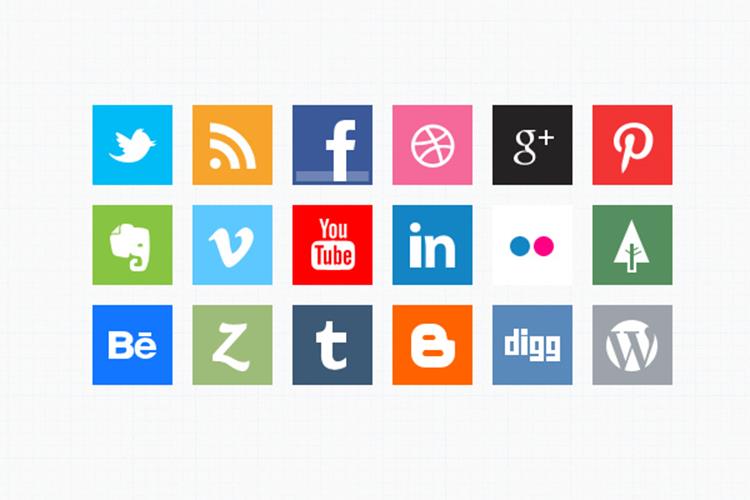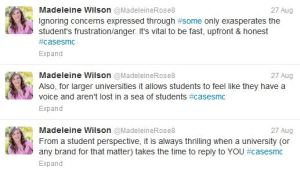The #1 reason my generation sucks at the Internet is not because we don’t know how to use it – it’s because we don’t know how to use it correctly.
DISCLAIMER: I’m not saying everybody in my generation sucks at the Internet or that everybody else is perfect. Just some people. There are SO many people who use the Internet and social media for amazing things. And this also is by no means trying to be a rule book or anything. I just wanted to explain some of my personal pet peeves and suggestions to remedy those.
Let me preface by saying that my online social presence is in no way shape or form perfect. However, I would like to believe that I’m above average when it comes to presenting myself professionally and appropriately online. I check for spelling. I avoid swear words. I do not post about how much my ex boyfriends suck, how that one girl smells terrible, how much I hate Obama, how all Christians are insane, or about that crazy wild party I went to last night where I hooked up with the boy with the blue hat. No. I try to post about my professional development, success in school, exciting personal events, funny jokes, and inspirational sayings. I am conscious of what people perceive when they look at your social media personality, especially professionally.
I’m 99.99% positive that every young adult wants to appear educated and classy – especially online where so much of your reputation is within your control. I would also assume that 100% of young adults want to have a job. Well guess what? 68% of employers will look at your Facebook. Companies use social media for filling 80% of job openings. Your online presence is everything. Oh, your profiles are all on private? There are ways around that, I guarantee. Nothing is private or anonymous anymore.
So here we go – here’s what my generation does wrong online:
- We are very verbal about our political beliefs —> Okay seriously, nobody cares that you hate (or love) Obama. Nobody is going to change their own personal political belief just because John Smith hates ObamaCare and posted a status about it.
- We swear too much (not that swearing is necessarily a bad thing….see bullet below) –> There is a time and place for swearing. For comedic effect. For emphasis on something. It’s only effective when it’s used in moderation and appropriately. There is a fine line. It is not cute or funny or useful when you insert particular four letter words into every sentence.
- We are negative assholes —> Example A of why swearing is appropriate in that sense – it’s true! Why do we feel the need to complain about every single thing in our lives online? Whatever happened to spreading positivity? Yeah, yeah, I know – sometimes you just need to vent somewhere. The occasional tweet about how the barista spelled your name wrong is fine. Normal. But when did social media become an outlet for you to spew your negativity into everybody’s newsfeeds?
- We like to have “debates” online —> This irritates me, but I also find it pretty hilarious. People seriously have debates on people’s statuses. One person posts a political belief and the other person responds with how dumb they are and it goes back and forth forever. There is no “agree to disagree.” There’s no moving on. People feel like they are invincible online and just think they have super powers to influence everybody else that reads their post. In reality, people don’t care what you have to say. They’ve already made up their mind if they’re posting it on social media. So why bother arguing?
- We annoy everybody with our religious beliefs —> See my point about political beliefs
- We bully —> This point is very near and dear to my heart since it was something I battled with my entire junior and senior years of high school. Once again, this theme of invincibility resurfaces. Just because you’re sitting behind a computer screen does not mean you aren’t having an effect on somebody or that you’re anonymous. Nothing is anonymous. Nothing is ever deleted. Just because it’s online and not in person does not make it any less harmful. A threat online is just as illegal as a threat in person. Our generation has gotten really comfortable sitting in our chairs, facing a screen, and using it as an outlet to share every single thought on our mind – even if it is incredibly hurtful. People think that clicking that “anonymous” button truly deletes their identity. Well I have a newsflash: It doesn’t. In the case of bullying, technology is used in the worst way possible. You do not become stronger by bullying somebody online – you are a coward. (I’m going to have a post coming soon that discusses cyberbullying in more detail because I don’t want to bore you here)
- We post pictures of ourselves in inappropriate clothing —> Would you want your dad to see you in that outfit? No? Okay then don’t post it. I don’t think I need to say anymore here. Basically, if you don’t respect yourself, nobody else is going to respect you. A pretty standard guideline for dressing in public is to dress classy. But if you make the decision to dress up for a party or whatever (I know I’ve done this LOTS of times), just don’t post those pictures online. Yes, you probably looked adorable in your “Naughty Nurse” outfit for Halloween. But your dad and your boss probably don’t want to see that. Use common sense.
- We don’t know how to spell or use correct grammar —> Our generation comes off as highly uneducated. I understand sometimes you want to type “dont” instead of “don’t” or “wanna” instead of “want to.” I do it all the time. But there’s a line between that and not knowing the difference between “there,” “their,” and “they’re.” Sometimes we look uneducated.
- We brag about our underage alcohol consumption and frequently post photographic evidence of it —> It should not come as a shock to anybody that drinking alcohol when you are under the age of 21 is illegal. So why, WHY, would we be tweeting about how wasted we got last night and posting pictures of us playing beer pong on Facebook? This one is pretty self-explanatory.
- We post about our illegal drug use —> Not legal for anybody to do. DO YOU WANT TO GET HIRED? Good lord.
- We post stupid, pointless, annoying crap —> Nobody cares that you ate a hot dog at 2am on a Tuesday.
Before you post ANYTHING online, ask yourself: “Would I be okay with my boss (or dad) seeing this?”
So I’ve put together these few guidelines to hopefully help my peers out. Not to preach at them, no. I just want to simply provide some helpful suggestions:
- If you want to post about your political affiliation —> Share a cool picture or status or tweet from your favorite politician if they post something really noteworthy. Don’t bombard everybody your own personal rendition of it. They’re the expert on the subject, not you.
- If you want to swear —> Use it for comedic effect or when you REALLY feel strongly about something. Not all the time. If you swear lots in person, that’s totally fine. But limit it online.
- If you have a really horrible day and want to vent about it —> Find a funny meme that relates to the situation you’re in. Instead of being a Debby downer, making light of the situation will make you feel better and be much more enjoyable to everybody else.
- If you want to debate politics or religion or anything for that matter —> Go to an online forum. There are PLENTY made specifically for that. Twitter, Facebook, and other public social media platforms are not the place.
- If you want to share your religious belief —> Post about one really great thing it led to. Or maybe share your favorite Bible verse. Do not preach to anybody. Do not try to convert anybody. Do not play that “holier than thou” card.
- If you want to bully —> If you don’t have anything nice to say, don’t say anything at all. But if you’re just the kind of person where that doesn’t cut it for you, talk badly about people to your friends. Don’t tell the person those things. Don’t be mean. Don’t say anything online. Just maybe share your dislike for somebody with your best friend when you’re in the privacy of your own home. But…..really, just be nice. It’s not that hard.
- If you want to dress up in inappropriate clothing and post it for everybody to see —> Try to put stuff on private as much as possible (which kind of defeats the purpose of posting it in the first place, but whatever). Or consider a job at Hooters.
- If you want to use incorrect spelling and grammar —> Use it sparingly. Or look uneducated. It’s up to you.
- If you want to post about your underage drinking —> Same rules as the inappropriate outfit: put that stuff on private as much as you can. You can also create a private page on Facebook between just you and your friends and you can talk about it all you want on there.
- If you want to post about your drug use —> See above.
- If you want to post about random, pointless stuff —> Create a blog or something so that you’re not clogging up everybody’s newsfeeds with your 25 statuses a day. People who also care about your random stuff can follow you and you can share pointless things together.
Well, I ended up sounding a little preachy. I’m sorry about that. Again, I want to stress that I definitely could learn from all of these points – I am nowhere near perfect and I definitely do not have a completely clean social media presence. But these are the aspects I strive towards (or away from). I’ve been trying really hard lately to portray myself as a professional young woman who is ambitious and goal-oriented. Does that mean I don’t have a single post I regret? Not at all. We’re all dumb. We’re all careless. It happens. But I find that my generation does not THINK about any potential consequences before they post. Unfortunately, with how prevalent social media is today, a tiny mistake online can result in a devastating consequences professionally or personally.
I’ll leave you with these two simple rules: think before you post and use common sense.




